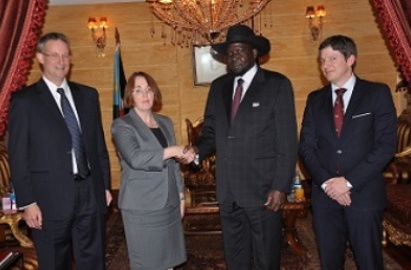U.S. hints recalling its Ambassador from South Sudan over atrocities
September 21, 2016 (JUBA) – United States has hinted the possibility of recalling its current Ambassador to South Sudan over the ongoing “documented” atrocities committed by the leadership of South Sudan under her watch.

They said the atrocities committed have been documented but with impunity involving other parties, including the ambassador.
“Yeah, the suggestion, I think recalling our Ambassador for that kind of conduct would be an appropriate response to show that we don’t want to have a mission headed by an Ambassador with impunity,” said Ben Cardin, a ranking member of the Committee, in reaction to earlier suggestion to recall the Ambassador.
Bob Corker, the Chairman of the Foreign Relations Committee in the Senate, in his earlier remarks, also suggested whether or not the South Sudanese President, Salva Kiir, should be declared a “war criminal” over the atrocities.
Meanwhile, Senator Cardin, said he had lost confidence in the peace process in South Sudan.
“I have lost confidence in the peace process…I don’t believe the current leaders are capable of bringing their country into peace,” he said, referring to President Kiir and his new first deputy, Taban Deng.
He also described the newly appointed First Vice President, Taban Deng, as someone who has no constituency in South Sudan is not able to heal the nation.
“We haven’t talked about Mr. [Taban] Deng, who I understand has no constituency. He is part of the corrupt, the corruption that has been documented. He is unpopular,” said the senior senator.
The Senators accused the South Sudanese rival leaders, Salva Kiir and Riek Machar, of committing atrocities and failing their people.
The top U.S. senator also accused president Kiir’s government of war crimes and attack on his rival, Machar, in July which resulted to the recent violence in the capital, Juba.
“As this crisis erupted in July, President Kiir’s forces apparently fired on U.S. diplomatic vehicles, shot and injured a U.N. official, terrorized American and other aid workers, and executed a South Sudanese journalist,” he said.
“President Kiir consolidated control after yet another contrived military action against his former deputy, Riek Machar. Kiir’s recent replacement of Machar with a poorly-supported opposition alternative likely invalidates the unity government and the August 2015 peace agreement itself,” charged the top U.S. Senator.
The Senators also blamed the United Nations peace keepers in the country for not doing enough to protect civilians from the government’s forces.
“Again, I don’t know how many times we’re going to hear of our peacekeeping efforts falling short. I know this is a unique circumstance but I believe the U.N. has been totally feckless as it relates to addressing this issue. Again, I know that these people are overstretched right now in South Sudan, but it continues to be a problem with U.N. peacekeeping troops,” he said.
Witnesses who presented their respective testimonies during the hearing include Jok Madut Jok, Co-founder and Executive Director, The Sudd Institute; The Honourable Kate Almquist Knopf, Director, Africa Center for Strategic Studies, U.S. Department of Defense; Luka Biong Deng, Global Fellow, Peace Research Institute; and Peter Yeo, President, Better World Campaign, United Nations Foundation.
The Senators warned that a Plan B would be needed to change the situation, including sanctions against leaders, imposed arms embargo as well as putting South Sudan under a trusteeship of the African Union and the United Nations.
(ST)
